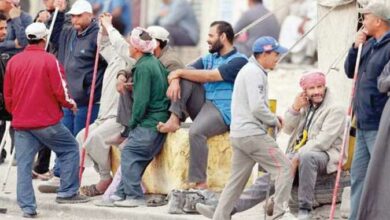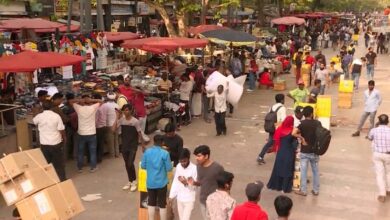Hundreds of sewing machines inside the Mega Textile Company S.S.C. stand idle. American label pants that usually sell for US$60 are piled on tables, unhemmed. Production at this clothing factory had been at a standstill for over a week.
“There are about 3000 people who usually sit here, and about 2000 there,” said Sehein Mohammed, a 2009 University of Mounoufiya graduate who studied agriculture, pointing around the dark and empty warehouse-sized building. Since graduating she has worked in the factory for a salary of about LE400 per month.
The Egyptian cabinet announced a minimum wage of LE700 for government employees last Wednesday, the new government’s first concessions to the country’s labor movement, which has become increasingly vocal since the revolution, but it fell short of the minimum monthly salary of LE1200 that activists and workers had been calling for across all sectors.
With an interim government and newly organized unions, it remains to be seen what gains the country’s workers, especially at private enterprises, will be able to achieve in the transitional period.
According to Kamar Saber, executive director at the Land Center for Human Rights, there are over 150 newly established unions in Egypt, with membership ranging from a few hundred to a couple of thousand workers or farmers.
Non-governmental organizations like his, Saber said, have not had time to conduct any sort of documentation about strikes and sit-ins since the revolution.
“They have been too busy trying to form unions,” he said.
But the reality on the ground for workers and farmers in Egypt has yet to significantly change since the revolution.
“There is no real difference between now and before,” he said. “But there is an opportunity for them, now.”
Formerly, the state-controlled Egyptian Trade Union Federation was the only legal way workers could demand rights from their employers. Originally founded under Nasser-era socialist policies, it was implemented to establish a minimum wage and was successful at making gains in workers rights.
But in the Mubarak era, the organization became an arm of the controlling regime. Workers could only associate and strike with its approval. The elections of federation leaders were largely seen as rigged.
“It has remained an undemocratic organization,” wrote Joel Beinin, Professor of Middle Eastern History at Stanford University and an expert on the Egyptian labor movement in “Justice for all: The Struggle for Worker Rights in Egypt,” a 2010 report by the American non-profit Solidarity International. “This has prevented it from evolving to meet the needs of workers,” he wrote.
Now, independent union organizers are free to enter factories, but once inside, they have a lot to tackle.
“We have to gather people, have to tell them how to form independent unions; we have to tell them how strong unions can be; we have to tell them not to be afraid of the state; we have to tell them what role they can play,” said Kareem al-Bohairy, a researcher at the Rural Studies Center, which helps farmers and workers unionize.
And in many factories, like Mega Textile, new unions with little previous experience may be trying to address worker’s rights and safety problems for the first time.
Workers at the Mega Textile factory accused the management of improperly disposing of toxic dyes in the factory compound near a dirt soccer field. They said they were allowed to go to the bathroom only once during the working day. Others who had been working at the factory for years were frustrated that their salaries were hundreds of pounds lower than those who were just hired months ago. They said the Indian workers the factory had hired to work there were paid three times their Egyptian counterparts, a common practice in many large factories, according to Bohairy and other labor activists.
Researchers at the Rural Studies Center believe there might be around 200,000 foreign factory workers in Egypt. The workers at Mega Textile considered the practice an affront.
“We want to be treated with respect,” said Mohamed Matar, a worker who has become an unofficial spokesperson for the Mega Textile strike.
A grassroots Egyptian labor movement has been growing steadily for the past decade. In 2006, a series of strikes at Mahalla, a spinning and weaving industrial center north of Cairo, sparked similar strikes around the country. In 2007 and 2008, there were protests in both government and private-owned factories. And the momentum that labor actions added to the protests was crucial in finally pushing Mubarak to step down.
But Mubarak’s government frequently targeted activists and worker leaders with arrests and intimidation, and it is unclear to what degree the Supreme Council of Armed Forces will allow them to function now.
The council, which has ruled the country since Mubarak stepped down, has banned any protests or demonstrations that might be deemed disruptive to the economy.
Mega Textile workers said management threatened them that the army would come to the factory to forcefully end the strike. The army never came. The threats did not stop them, or other factories in Medinat Sadat, from continuing their strike.
“The voice of the workers is coming, those that make Egypt strong,” they yelled in the courtyard next to the factory.
Labor activists say the transition to a free and independent workers' movement will take time.
In the short term, Bohairy and Saber agreed that factories may close, and jobs may be lost, but Egyptian workers can emerge victorious. They both pointed to cases of workers’ self-management, when Argentinean workers' movements took over running factories after they went bankrupt.
And Bohairy also sees organized labor as an emerging political force.
“The country needs both unions and a party,” he said. “How can we have the majority of our population not represented in this way?”
The strike did bring about changes at Mega Textile. After nearly two weeks of striking, the Turkish owner of the factory agreed to sit down with a group of the coalition. Matar, the textile workers’ spokesman, said that he had agreed to the majority of the workers’ demands, and he said most of the workers were happy with the concessions.
Perhaps one of the biggest changes since the fall of the old regime has been in the outlook of the Egyptian workers.
“Now, workers know their rights, the weapons they can use,” said Saber.
Walking through the darkened factory, Mohammed said she wasn’t scared about losing her job because of the strike or the workers’ demands not being met. She said she was hopeful.
“We never did this before January 25,” she said. “Now, there are always other factories.”




